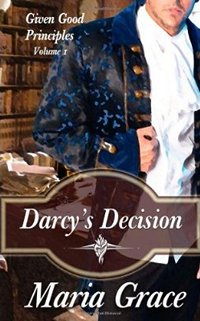Before Mr. Darcy’s Little Sister (2010), Miss Darcy Falls in Love (2011), Georgiana Darcy’s Diary (2012) or Loving Miss Darcy (2013), or any of the other numerous Pride and Prejudice sequels elevating Georgiana Darcy to main character, there was Presumption: An Entertainment, by Julia Barrett (1993). Of all of the minor characters in Pride and... Continue Reading →
Jane, Actually: or Jane Austen’s Book Tour, by Jennifer Petkus – A Review
From the desk of Jeffrey Ward: What would YOU say to Jane Austen if it became possible to communicate with her personally after two centuries? Jennifer Petkus’ third novel, Jane, Actually explores that possibility with an endless array of “what-if’s:” Is there an afterlife? If so, in what form? If departed souls are immortal, will... Continue Reading →
The Passions of Dr. Darcy, by Sharon Lathan – A Review
From the desk of Kimberly Denny-Ryder: Some series are just too good to let go, whether they be movies, TV, or books. Sharon Lathan’s Darcy Saga, inspired by Jane Austen’s Pride and Prejudice, is one such series. I’ve had the pleasure of reading all six of the previous novels, and I was sure that book... Continue Reading →
Jane Austen First Editions: How Much is Yours Worth?
Just in case you were interested to know how much your first editions of Jane Austen's works were worth, this video featuring Adam Douglas, Senior Specialist in Early Literature at Peter Harrington, a rare book dealer in London, introduces a selection of Jane Austen’s first editions and explains how bindings affect value. We just love... Continue Reading →
Return to Longbourn: The Next Chapter in the Continuing Story of Jane Austen’s Pride and Prejudice, by Shannon Winslow – A Review
From the desk of Kimberly Denny-Ryder: Ever since Shannon Winslow debuted with The Darcys of Pemberley (DoP) in 2011, she’s been an Austen fan-fiction author that I’ve kept on my radar. In the two years since she published DoP I’ve not only read everything else she’s written, For Myself Alone (2012) and Mr. Collins’s Last... Continue Reading →
A Change of Heart: A Regency Romance, by Candice Hern – A Review
This is my second selection in the Regency Romance Reading Challenge 2013, our celebration of Regency romance author Candice Hern. We will be reading all of her traditional Regencies over the next nine months, discussing her characters, plots and Regency history. You can still join the reading challenge until July 1, 2013. Participants, please leave... Continue Reading →
Georgiana and the Wolf: Pride and Prejudice Continues Volume 6, by Marsha Altman – A Review
From the desk of Veronica Ibarra As if reading about the continued lives of our favorite characters from Pride and Prejudice and that of their children is not fascinating enough, send one Georgiana Bingley to seminary in France, throw in a murder with the rumor of a werewolf, and you potentially have something quite interesting.... Continue Reading →
A Proper Companion: A Regency Romance, by Candice Hern – A Review
Today marks the official opening of the Regency Romance Reading Challenge 2013, our celebration of Regency romance author Candice Hern. We will be reading all of her traditional Regencies over the next nine months, discussing her characters, plots and Regency history. You can still join the reading challenge until July 1, 2013. Participants, please leave... Continue Reading →
Preview & Giveaway of The Greville Family Saga: The Passing Bells, Circles of Time, and A Future Arrived, by Phillip Rock
I love a good mystery. I just didn’t know that I would be so personally engaged in one for over thirty years. In 1980 a read a book about an aristocratic English family during WWI that I absolutely adored. I was so enthusiastic about it that I promptly loaned it to my best friend who... Continue Reading →
Darcy’s Decision: Given Good Principles Volume 1, by Maria Grace
From the desk of Jeffrey Ward For 200 years, I suspect many enthralled readers of Pride and Prejudice have silently pondered the question “What would Darcy do?” Author Maria Grace endeavors to put her own spin on this with her debut prequel novella Darcy’s Decision, in her Given Good Principles trilogy. Spanning a brief but... Continue Reading →
Sons and Daughters: Darcy and Fitzwilliam Book Two, by Karen Wasylowski – A Review
From the desk of Shelley DeWees Care for a slice of dialogue? I promise that you’ll find it irresistibly juicy, bursting to the seams with wit and character. This is Karen Wasylowski’s work, after all, and you may still have the lingering juices from her first book Darcy and Fitzwilliam on your tongue. It tasted... Continue Reading →
Bewitched, Body and Soul: Miss Elizabeth Bennet, by P. O. Dixon – A Review
From the desk of Kimberly Denny-Ryder With the amount of Jane Austen fan fiction writers that write “what if” variations, you’d think that by now they would be running short on new scenarios. Thankfully, new and imaginative writers keep entering this genre and introduce new variations on our favorite old classic. P.O. Dixon is one... Continue Reading →










